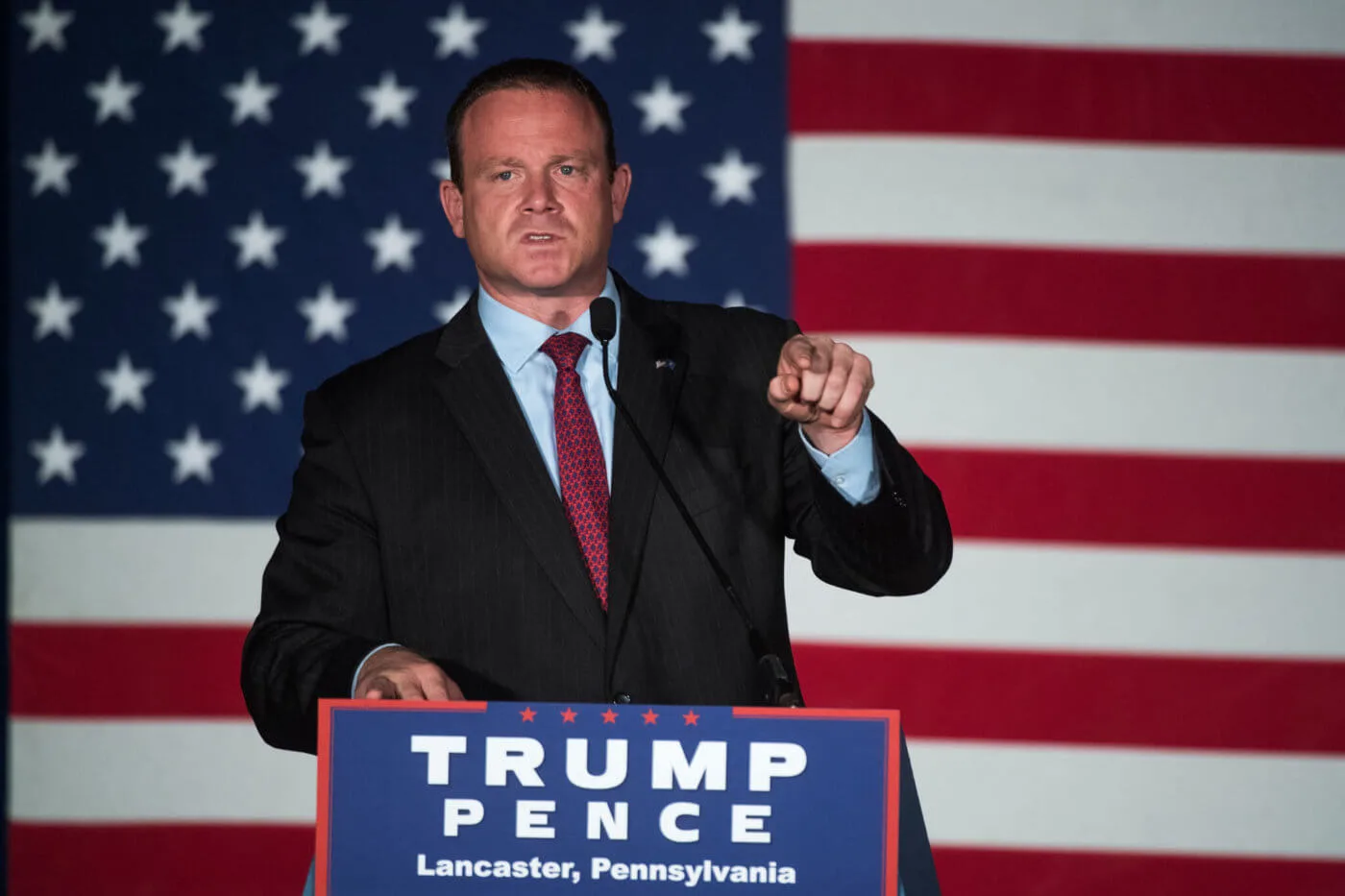
Scott Martin addresses the crowd before Republican vice presidential candidate Mike Pence, spoke at the Host Resort in Lancaster, Pa., August 9, 2016. (Photo By Tom Williams/CQ Roll Call)
The Pennsylvania Youth Congress pointed out that one of the bills could force schools to out students to their parents, even if they’re not supportive, and accused Republicans of fear-mongering about children being shown “pornography.” Despite insisting children have been shown pornography, the Republicans behind the bills failed to provide any such evidence.
Pennsylvania Republicans advanced two bills last week that seek to censor discussion of sexual orientation and gender identity in Pennsylvania schools, legislation that opponents say could harm already-struggling LGBTQ youth.
The bills, from Republican state Sens. Ryan Aument and Scott Martin, both of Lancaster, mimic similar legislation passed in Florida this year, which critics quickly dubbed the “Don’t Say Gay” bill.
Aument’s bill, SB 1277, would require schools to notify parents of any material containing sexually explicit content that is made available to students in schools as part of the curriculum or in school libraries. Parents would have the ability to request alternative materials that are not explicit and could also prevent their children from viewing certain books at the school library.
Martin’s bill, SB 1278, would ban classroom instruction on sexual orientation or gender identity through grade 5. The bill would also require schools and teachers to follow existing state standards of age-appropriate and develolopmentally appropriate content for any instruction of gender identity and sexual orientation that occur in grades 6-12. Notably, the bill also empowers parents or legal guardians to sue teachers, schools, school board members, and school districts for damages over alleged violations of the bans.
SB 1278 would also require public schools to develop a policy for notifying parents when there is a change in the student’s services or monitoring related to the student’s mental, emotional or physical health or well-being. Schools would also be required to allow parents access to the student’s education and health records. The only exception where school personnel could withhold any of the above information is if they believe, based on documented testimony or incidents, that disclosure of such information would result in child abuse or the child being abandoned.
Both proposals passed out of the Senate Education Committee last Tuesday via 7-4 votes along party lines and will now go to the full Senate. Pennsylvania Gov. Tom Wolf has already vowed to veto the bills if they reach his desk and the bills have already been roundly condemned by pro-LGBTQ organizations.
The Pennsylvania Youth Congress pointed out that SB 1278 could force schools to out students to their parents—even if they’re not supportive—and allow parents to prevent their child from receiving support services related to sexual orientation or gender identity.
Freddy Pernell, the commissioner of Pennsylvania’s LGBTQ Affairs Commission, cited his own experience as why the bills could be damaging to children.
“I was 11 years old when I first came out. I was scared when I realized that I was gay, since my home environment wasn’t the most affirming place,” Pernell said. “I was lucky that my school had a variety of experts and out teachers who I could go to for advice. These LGBTQ teachers became mentors that were crucial to my development into the person I am today. Efforts to keep conversations about identity out of schools will only hurt kids who are trying to come to discover who they really are.”
The Pennsylvania State Education Association and the Pittsburgh Federation of Teachers have also expressed concern about the bills.
Aument and Martin—who leads the Senate Education Committee—claim their bills are intended to give parents control over the sort of content their child is exposed to and are a response to concerns they’ve heard from parents. They reject the notion that their bills could harm students, arguing that their proposals do not ban organic, student-led discussions of sexual orientation and gender identity—only instruction and formal dsicussions led by the teacher.
“Our goal is certainly not to ostracize, demonize, or harm LGBTQ students in any way,” the senators said in a press release. “Rather, we want to find a fair solution that honors the very real concerns of parents that these sensitive topics are consistently being taught without their consent or knowledge to elementary school students.”
Opponents of the bills aren’t buying it. Preston Heldibridle, executive director of the Pennsylvania Youth Congress, accused the Republicans of deceiving Pennsylvanians about their true intentions.
“The people pushing these bills are purposefully conflating graphic pornography with children’s books that reference LGBT families in hopes that Pennsylvanians won’t notice. They are trying to sneak in this horrific, subversive attack on LGBT inclusion under the guise of reasonable limits on sexually explicit content. Those limits already exist,” Heldibridle said in a statement following the vote. “They cherry pick outlandish scenarios to advance categorical bans to appear like defenders of children when in reality, proponents of these bills are the ones exploiting children to further their own goals and causing irreparable harm.”
Aument claims he’s not trying to ban books or prevent children from being exposed to diverse books, but to protect them from “pornography.” As Aument spoke during last week’s hearing, he held up a manilla folder of material he claimed was pornographic, but did not give specific examples.
“We are talking about images of young children performing oral sex on each other,” Martin added, without offering up any evidence that any books featuring children engaging in oral sex are available in schools or school libraries.
In a press release issued after the hearing, Aument and Martin cited multiple news stories regarding discussions of sexual identity or gender orientation that helped motivate their bill, none of which were pornographic in nature.
The committee’s Democrats echoed Heldibridle’s concerns. State Sen. Lindsey Williams (D-Allegheny), who serves as the minority chair of the committee, blasted SB 1277 as a “book ban” that risked excluding materials about female puberty or images of works like the Statue of David.
“This bill is framed like we are trying to keep pornography and Hustler magazines out of the school library. Neither of which are in our school buildings or will ever be,” Williams said.
She also argued that SB 1277 is so vaguely worded that it could make it impossible for schools and school librarians to implement it, which could lead them to just remove all books relating to LGBTQ identity or gender orientation. Williams also pointed out that parents already have the right to review curriculum and opt children out of lessons that conflict with religious or deeply held beliefs.
Speaking about SB 1278, Williams said it was even worse than Florida’s “Don’t Say Gay” bill. “It’s saying that being gay, having trans parents, having a lesbian friend, is wrong, is less than, is something to be ashamed of,” Williams said. “That is wrong.”
Heldibridle furthermore argued that if the bills were only about sexually explicit material and discussion, they would be more narrowly written. Instead, he called it a “stealth attack to try and make sure young Pennsylvanians receive no positive representation of LGBT people.”
“The idea behind the curtain is that if young people don’t know about LGBT people then they won’t become out LGBT people. Yet, we have always been here and are not going anywhere,” Heldibridle added. “Whether they ban references to our existence in the classroom or not, we are still here.”
Some of the comments from Martin and Aument’s fellow Republicans suggest these criticisms aren’t without merit.
Republican state Sen. John DiSanto admitted during the hearing that he supported the bill because it censored ideas. “I would be supportive of limiting ideas” in the classroom, DiSanto said.
The Republican nominee for governor and far-right state Sen. Doug Mastriano, also approved of the bills, likening the inclusion of LGBTQ-friendly materials to “indoctrination” and “child abuse” and said it was turning school into a “place to groom kids, potentially.”
Mastriano’s rhetoric resembles those of other far-right extremists who in recent months have launched ugly attacks against LGBTQ people, teachers, and Democrats, accusing them of being “child groomers”—a term used to describe someone who gets close to and builds trust with a child or young person with the intent of sexually abusing them.
As Williams noted during the hearing, the bills and rhetoric accompanying it aren’t happening in a vacuum. Nationwide, more than 300 anti-LGBTQ bills have been introduced by state lawmakers this year, including a bill to ban trans women from playing women’s K-12 sports in Pennsylvania, which the state Senate passed earlier this month.
The impact of these bills and increase in anti-LGBTQ rhetoric has been devastating for LGBTQ youth. A recent survey from the Trevor Project found that 85% of transgender or gender non-binary youth ages 13-24 and 66% of LGBTQ youth said their mental health had been negatively impacted by these legislative attacks.
Rafael Álvarez Febo, executive director of the LGBTQ Affairs Commission, linked the sorts of bills Aument and Martin have introduced to the rise in anti-LGBTQ violence. “These bills have emboldened far right hate groups to mobilize to commit violence against LGBTQ people,” he said.
Heldibridle warned that the bill could worsen the experiences of already-struggling LGBTQ children and accused Republicans of playing political games.
“For Senator Martin and Senator Aument: How many hurt, abandoned, or dead LGBT children are enough for you to end this crusade?” he asked. “There are other issues you can choose during an election season to flex your political power over picking on LGBT children. These bills are mean-spirited and will not rest well with history.”
Álvarez Febo also blasted the senators for prioritizing these sorts of bills while Pennsylvania’s struggle with multiple overlapping crises.
“While Pennsylvanians are struggling with very real issues such as gun violence, soaring prices and underfunded schools, the General Assembly has chosen to pick on LGBTQ children and teachers to score political points,” he said.
Politics

Biden announces tariffs on Chinese Steel while visiting United Steelworkers members
“I'm president because of you guys. I really am and I'm proud. As was mentioned earlier, I'm proud to be the most pro-union president in American...

Opinion: Is Reproductive Healthcare just a women’s issue?
In this op-ed, Pennsylvania resident Lynn Strauss discusses the Republican Party’s conflicting stance on reproductive healthcare policy and the...

2 top US gun parts makers agree to temporarily halt sales in Pennsylvania
Philadelphia filed suit against Polymer80 and JSD Supply last year, accusing the manufacturers of perpetuating gun violence by manufacturing ghost...
Local News

Conjoined twins from Berks County die at age 62
Conjoined twins Lori and George Schappell, who pursued separate careers, interests and relationships during lives that defied medical expectations,...

Railroad agrees to $600 million settlement for fiery Ohio derailment, residents fear it’s not enough
Norfolk Southern has agreed to pay $600 million in a class-action lawsuit settlement for a fiery train derailment in February 2023 in eastern Ohio,...






